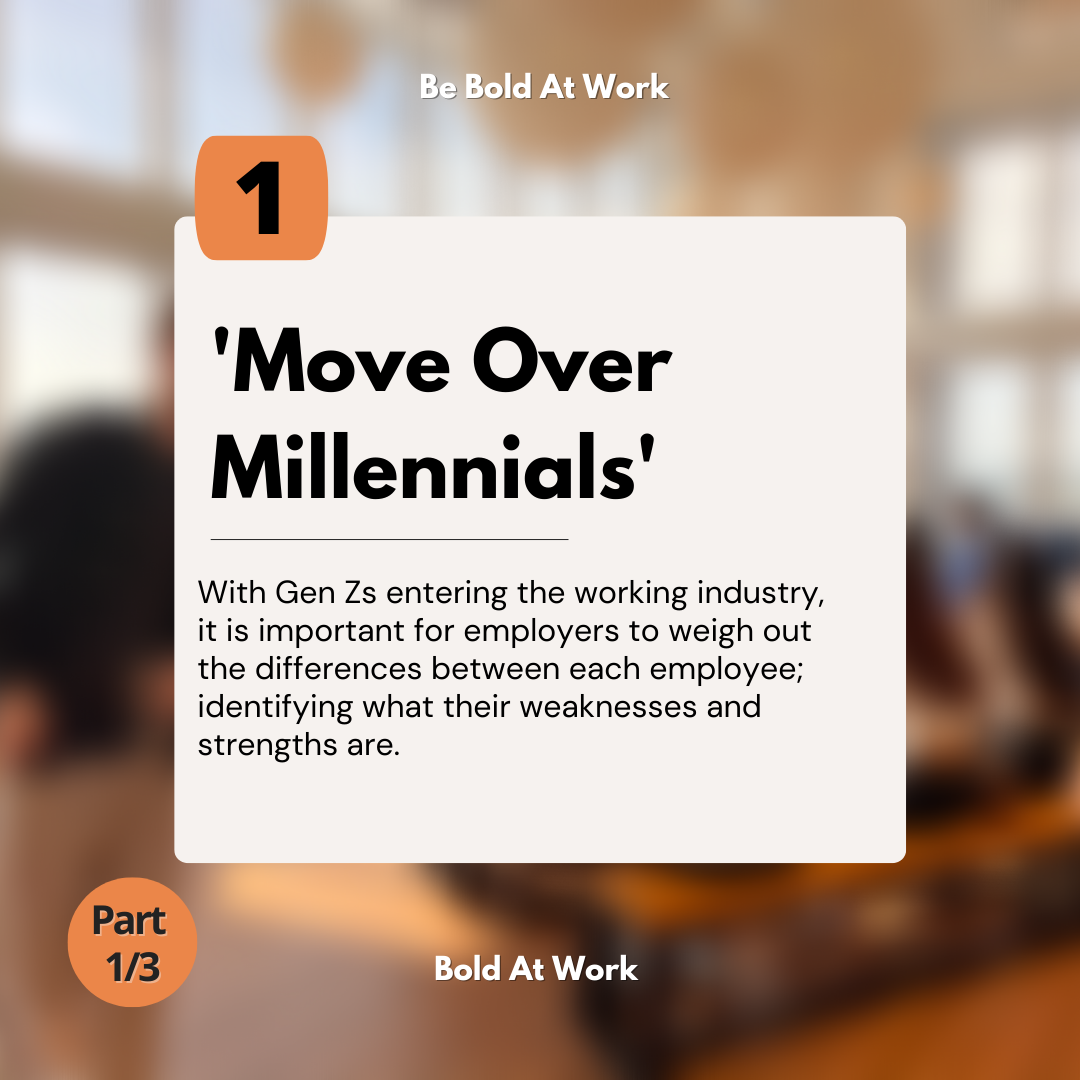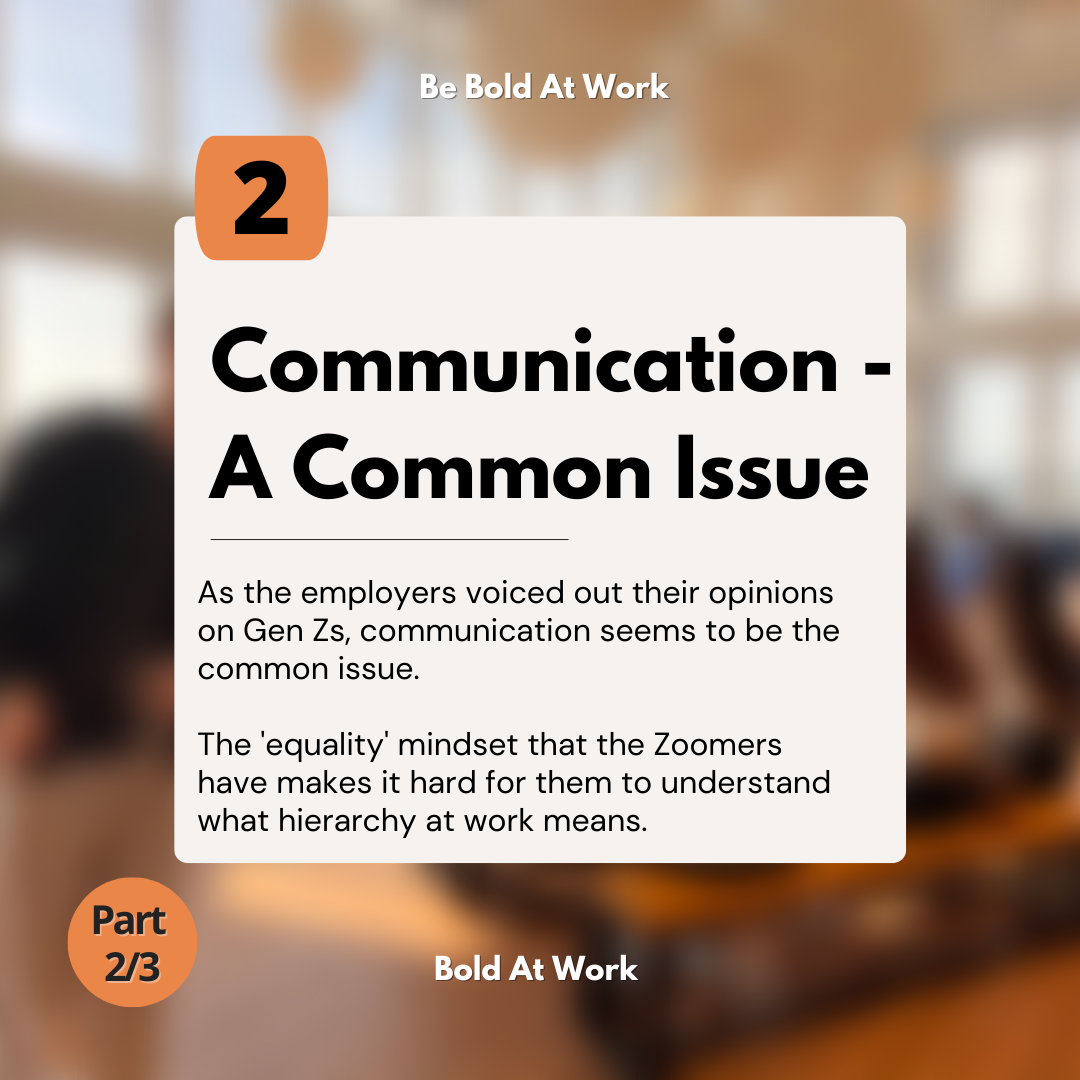Bridging The Gap: Gen Zs At Work
Fatmah K. Content Writer Intern
Did you know that by 2025, Gen Zs (born from 1996 to 2010) will account for 27 percent in the workforce? As a Gen Z myself, I did not realise how fast time is passing by, that I too will soon make up part of this 27 percent, when I graduate from polytechnic.
In my previous article, I explored the job-hopping trend, one that is prevalent among Millennials. As I followed my curiosities, I started to get interested as to how employers are handling this change in taking in a new generation at work, and how do Gen Zs like myself feel about work?
The key difference between a Gen Z and a Millennial is that Gen Zs are born into the world of technology, whereas, Millennials witnessed the evolution of it. This may serve as an edge that Gen Zs possess in the digital world we live in today. Channel News Asia even carried a commentary on how older workers, even Millennials, are feeling threatened by the confidence levels the Gen Zs exude at work.
Forbes interviewed a roundtable of CEOs on their perspectives of working with Gen Zs. Challenges and complaints run the gamut from being impatient and entitled, to lacking discipline. They’ve even been called ‘exhausting’ because they do not hesitate to challenge their bosses.
Wondering if Gen Zs are really seen as difficult to work with, I interviewed some employers and managers in the circles around me, hoping to gain a perspective. To my surprise, I found a refreshingly positive view of Gen Z.
Gen Zs I’ve worked with are all very earnest and sincere”. CLM, a manager of 13 years in the hospitality industry, says, “because they have started work in the thick of the pandemic, they’ve encountered a much more confronting view of reality compared to the Millenials who graduated into relatively good times. She thinks that as such, Gen Zs are “hardier and have more grit in comparison to Millenials” and even expects that they have the potential to overtake the Millenials in their maturity, with the right guidance.
However, a theme that came up in the viewpoints shared by the managers was that there could be a difference in how the Gen Zs understand the meaning of communication at work. They felt that while Gen Z have an 'equality' mindset, what they need is to understand the role of hierarchy in a workplace setting.
CLM says that in terms of communication, they do not necessarily understand the nuances required in communication. As such, they need some guidance and help in contextualising their communications to different stakeholders. Growing up in the world of Instagram stories and TikTok, they perceive the world as very accessible and ‘equal’. But at the workplace, there is a natural hierarchy within an organisation that needs to be accounted for.
SY, a tech product developer with 13 years of work experience, concurs. She enjoys the fast pace of discussion and decision-making in working with the Gen Zs, as she experiences them as being straightforward and casual; they are also used to 24/7 communications, instead of the typical 9-5 work hours. However, she adds that they often need reminders, that submissions and official communications need to be more formal.
I then turned to my fellow Gen Z friends, to ask for their perspective. Indeed, they had a whole different take on hierarchy and the more formal and structured nature of the workplace. Natasha summarised well the “equality” mindset, when she said, “I think it is essential that employers treat employees equally, no matter the position and experience; it is important to understand the employee's way of learning and communicating”. In recalling her first job experience, Mahirah, from YoungNTUC, felt that “having a rigid way of working does not help us in appreciating our jobs”.
How then can workplaces bridge the communication gap with Gen Zs at work, and vice versa?
As a Gen Z myself, I believe building trust and relationships can be the connector of this difference. Creating a connection with Gen Zs as employers or managers is important to cultivate a mutually-respectful workplace. Fellow Gen Zs like myself tend to be sceptical and quick to judge, which makes it really important for trust to be built.
It might differ from person to person, but the key is to figure out what would deposit trust in the relationship account. For example, creating conversations during lunch where each can exude and express their own personality, or finding common topics that could relate to us, such as mental health, can help in creating deeper meaning that is a factor that Gen Zs look out for, a meaningful connection.
Other than that, injecting fun at work has major benefits. It increases employee retention rates which is always a good look for business. CLM’s tip was to introduce gamification at work, where you break down a large task into smaller ones so they look achievable, and celebrate the completion of the project! Recently at Bold, we had a major project where we did up a presentation wall; it took months to finally be completed but we celebrated with a pizza party at the end!
At Bold, we believe that activating the strengths and assets that Gen Zs bring to the table can help keep them more interested in doing their jobs. I also think that we can help them to feel more appreciated as well, through a mutually-respectful relationship. This supports them in finding alignment within the context of your workplace, so they can give of their best!
#BeBoldAtWork is a Design Your Workplace series that seeks to cover practical tips, stories and tools that would serve employees and employers to better design how you choose to think, feel and show up in workplaces so as to improve the performances of not only your organisations but also the lives of the people you work with.
If you would like for us to enter your workplaces to provide talks and engagements on workplace wellbeing & career resilience, drop us a note at hello@boldatwork.sg!


